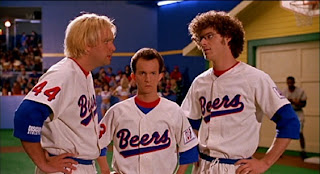When trying to make a list of my favourite films recently, I was struck by a few telling things. Firstly: how few films were from mainstream cinema, and, secondly: my mortal weakness for the arty, wanky side of film. I know all the truisms about everyone being different and art being wholly subjective but it did make me reflect on what I value and enjoy in a movie, as well as my expectations from the medium. Without intending it, this quickly debated into a bloodied-knuckle discussion about ‘cerebral’, elitist indie and ‘brainless’, commercial Hollywood – which is better, and why do I prefer it?
I am clearly aware that the objectives of Mike Leigh when making a film are entirely at odds with those of Michael Bay; but it is where their differing methods and ideologies diverge that is most of interest to me. Should cinema be art or entertainment? Or both? Or neither? Should I be worrying about this at all?
As my friends would tell you, I remain an unflinching acolyte of the goofy, dick-joke style of fratboy humour, of which my DVD collection can bear testament. Are these comedies any worse films than other films in my collection, such as Barton Fink or Stroszek? If pushed, I would probably just as happily sit down and watch 90 minutes of (most) Apatow than I would suffer through 120 minutes of Haneke. But then – almost counter-intuitively – if pushed, I would have to admit that enjoyment and satisfaction isn’t the only reason I watch films; and it is by this logic that the quintessence of my taste is defined.
Genre will inevitably define the audience’s expectation of films and I am just the same as anyone in that in my love of horror and comedy, as well as my indifference towards action movies. However, what I truly value is that semi-mythical beast: the transcendent film that makes you think. Not a homo-erotic, greased up Rambo/Stallone “taking names”. And that doesn’t necessarily mean words on the screen and an almost teenage fascination with wanking. It can mean reference-heavy, literate dialogue, like the Coens or Tarantino; beautiful or innovative cinematography, like Roger Deakins or Christian Berger; or even the surrealist, what-the-hell-is-going-on? craziness of David Lynch. And of course much, much more. For me, what’s important is that the material is thought-provoking and will keep you talking in the pub or car or tube or house afterwards.
I think it’s possible to demand more from Hollywood without descending into Empire-reader geekdom or Nuts-buyer bloodlust. Recent startling and brilliant smash-hit Inception, with its coruscating special effects and cornucopia of WTF moments, may well lead the way towards a more nuanced blockbuster, somehow informed by arthouse. But until those days arrive, I’ll be happy with some gritty, weird and beautiful film from a former Yugoslav republic that might, in someway, change my perspective.
Comments, as always, are most welcome.











